Mission: Impact podcast & blog
Build a better world without becoming a martyr to your nonprofit cause
Listen on:
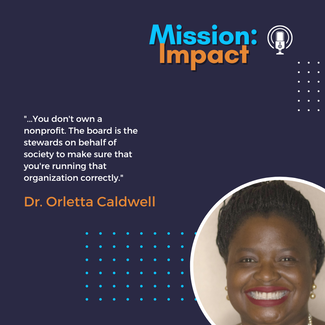 In episode 71 of Mission: Impact, Carol and her guest, Dr. Orletta Caldwell discuss:
Guest Bio: Dr. Caldwell is a passionate and qualified educator and nonprofit management specialist. Caldwell brings more than 30 years of administrative and leadership experience to the CEO of Beyond Existing Enterprises. Highlights of a stellar and diverse career include Executive Director, Camp Baber, and Assistant Professor at Grand Rapids Community College. She has served in many professional and volunteer capacities, including Tech Soup, the Community Development Advocates of Detroit (CDAD), Metro Detroit Council of Christian Churches, Urban Renewal Commission for the city of Colorado Springs, Colorado; Board Member/Secretary, Association of Gospel Rescue Missions and the Southfield Downtown Development Authority for Southfield, Michigan. She earned her Bachelor of Public Affairs from Wayne State University, Master of Science in Management from Cardinal Stritch, and Ph.D. in Public Policy & Administration specializing in Nonprofit Management from Walden University. Important Links and Resources:
Click "Read More" for Transcript: 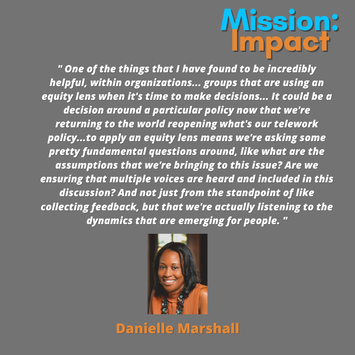 In episode 56 of Mission: Impact, Carol and her guest, Danielle Marshall discuss:
Guest Bios: Danielle is an inclusive leader focused on strengthening collaboration among teams, leaders, and stakeholders to foster problem-solving, create solutions, and improve culture. She finds inspiration in leading systemic change work that promotes equity and inclusion. Danielle has worked in the nonprofit sector for 20+ years most recently having served as the Executive Director for Playworks Mid-Atlantic. Danielle went on to found Culture Principles in response to a persistent need to move organizations beyond DEI statements to develop strategic and actionable equity goals. Danielle holds a Master's degree in Industrial-Organizational Psychology from Louisiana Tech University and draws on her background as an I/O psychologist in applying a racial equity lens to organizational policies, practices, and programs. She is a Certified Diversity Professional (CDP)/Executive Coach. Important Links and Resources:
Click "Read More" for Transcript: Helping nonprofits boards move toward greater equity with Christal Cherry and Renee Rubin Ross8/23/2022
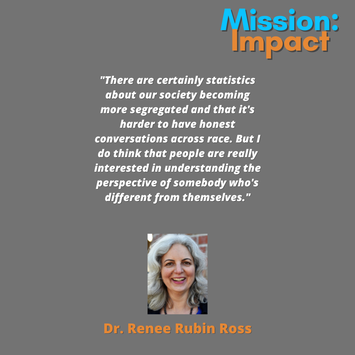 In episode 55 of Mission: Impact, Carol and her guests, Dr. Renee Rubin Ross and Christal Cherry discuss:
Guest Bios: Dr. Renee Rubin Ross is a nationally recognized strategic planning and board development consultant. Committed to racial equity in the nonprofit sector, Dr. Ross supports organizations and individuals in practices that celebrate and amplify diverse voices and perspectives. Christal M. Cherry is a nationally recognized nonprofit executive and professionally trained fundraiser. With over 20 years in the nonprofit sector, she has supported higher education institutions, human services organizations and faith-based missions. Her career portfolio, as a full time professional and consultant includes American University, the United Negro College Fund, Spelman College, Nicholas House, the Interdenominational Theological Center, Florida A & M University, Action Ministries, and the GA Center for Nonprofits. In each role, Christal has interfaced, guided and collaborated with diverse boards made up of college presidents, ministers and bishops, politicians, corporate CEO's, civic leaders, consultants, attorneys, stay at home moms and students. With passion and a wide breadth of experience, Christal works today with clients to help them mark a clear path to success in board development. Her style is electrifying, inspiring, and energizing. Christal earned a MA in Counseling from Hampton University, a BA in Liberal Arts from Hofstra University and professional development certifications in nonprofit leadership, social media fundraising, and nonprofit management. She currently serves on the board of the Greater Atlanta chapter of the Association of Fundraising Professionals and the Villages of Carver YMCA. She is regular presenter with CANDID, Qgiv, Network for Good, Bloomerang, and the Mississippi Alliance of Nonprofits and Philanthropy where she facilitates webinars and teaches courses in fundraising, board development and equity and inclusion. Christal has been a guest on multiple podcasts and enjoy serving as a requested expert on board matters. She is contributing author in Collecting Courage, a documenting of racism and survival by 14 accomplished Black fundraisers working across North America. She also enjoys her membership in the African American Development Officers Network, Toastmasters, and F3, Fabulous Female Fundraisers which she founded. Important Links and Resources:
Click "Read Morea" for Transcript: 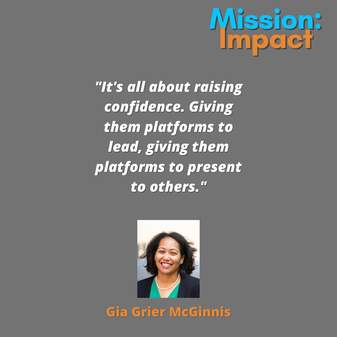 This episode is the final part of the Culture Fit project that Carol recorded with her son-in-law Peter Cruz. In this episode, Carol, her cohost Peter Cruz, and their guest Dr. Gia Grier McGinnis discuss:
Dr. Gia Grier McGinnis is a senior leader with over 17 years of broad-ranging experience in program management, advocacy, and community outreach. She has a passion for public engagement in STEM, and currently serves as the Executive Director of the UMB CURE Scholars Program, a groundbreaking healthcare and STEM pipeline program for West Baltimore youth. Dr. Grier McGinnis is a Baltimore, Maryland native where she still resides with her family. She enjoys exploring urban green spaces and volunteering to promote mental health awareness. Important Links and Resources:
Click "Read More" for Transcript: 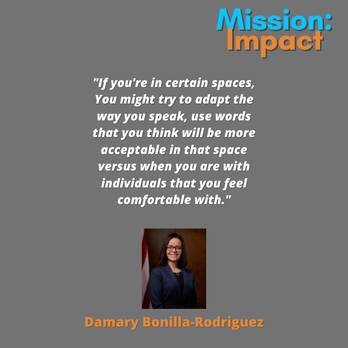 This episode is part of the Culture Fit project that Carol recorded with her son-in-law Peter Cruz. In this episode, Carol, her cohost Peter Cruz, and their guest Damary Bonilla discuss:
Guest bio: Dr. Damary M. Bonilla-Rodriguez is a national leading authority on leadership development, especially as it pertains to diversity and inclusion. She delivers keynote addresses and presentations drawing upon her experience from roles in the non-profit, private, and government sectors, as well as her doctoral research. Her research about Latina leadership in the United States has served as the foundation for events, conference sessions, publications, and content development - to address the urgency of leadership development for a fast-growing population and create a pipeline of diverse leaders. Dr. Bonilla-Rodriguez holds a Bachelor of Arts degree in Spanish and Social Work from the College of New Rochelle where she received the College President’s Medal, graduated with Departmental Honors, and was awarded the Sigma Delta Pi Spanish Award. She also holds a Master of Science degree in Organizational Communications and a Specialized Certification in Corporate Communications, both from the College of New Rochelle. Personal endeavors of overcoming statistics and accessing higher education, led her to earn a Doctorate in Education focusing on Executive Leadership from St. John Fisher College. To change the political and leadership landscape for Latinos, Dr. Bonilla-Rodriguez ran for State Representative in the 189th District of Pennsylvania in the 2016 election cycle where she became the 1st Hispanic to make a State ballot in Pike and Monroe Counties. In November 2019, she became the 1st Hispanic elected as School Board Director in the East Stroudsburg Area School District where she Chairs the Education and Negotiation committees. Passionate about supporting professional organizations, she is a Board Member of the Brodhead Watershed Association where she Chairs the Membership committee, Colonial IU 20 where she serves as Vice President, Prospanica NY where she serves as Vice President of Professional Development, Latina VIDA, Latinas on the Plaza and an Advisory Board member for several organizations including: The Board of Hispanic Caucus Chairs, Monroe County Children and Youth where she leads the Education committee, SciGirls, and the Alliance for Positive Youth Development. In addition, she was appointed by Governor Tom Wolf to represent the Poconos Region on statewide commissions on Redistricting Reform and Latino affairs (GACLA) where she Chairs the Education committee. Dr. Bonilla-Rodriguez was recognized as a 2014 Coors Light Lideres finalist and the recipient of numerous awards including a proclamation from the NYS Assembly, the Proud to Be Latina Soy Poderosa award, and the SISGI Beyond Good Ideas Excellence in Nonprofit Leadership award. Her published written accomplishments include the books Ethics, Gender, and Leadership in the Workplace and Today’s Inspired Latina (Volume II), as well as contributing to the Huffington Post and being featured by several media outlets including NBC Latino, Chief Writing Wolf, and the Empowered Latinas series. While, she is proud of her many accomplishments, she highlights her greatest as being the mother of eleven-year-old twin boys, Caleb and Joshua. She resides in Pennsylvania with her boys and husband Robert. Her favorite quote is: “If I have seen further, it is by standing on the shoulders of giants” (Newton). Important Links and Resources: Click "Read More" for Transcript: |
Archives
April 2024

Grace Social Sector Consulting, LLC, owns the copyright in and to all content in and transcripts of the Mission: Impact podcast, as well as the Mission: Impact blog with all rights reserved, including right of publicity.
|
Telephone301-857-9335
|
info[at]gracesocialsector.com
|
Grace Social Sector Consulting, LLC, owns the copyright in and to all content in, including transcripts and audio of the Mission: Impact podcast and all content on this website, with all rights reserved, including right of publicity.
|